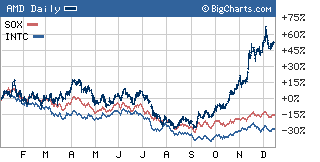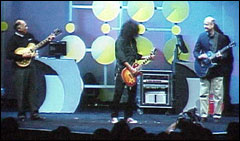
NEW YORK (CNN/Money) – Tech stocks have had a nice year-end rally but that hasn't been enough to pull the chip sector out of the red.
The Philadelphia Semiconductor Index has fallen nearly 15 percent in 2004 and for several large cap chip stocks, the year has been much worse.
Intel's (Research) stock has plunged 27 percent. So have shares of STMicroelectronics (Research). Chip equipment company Novellus Systems (Research) has lost a third of its value.
Faced with that backdrop, it's truly remarkable that shares of Advanced Micro Devices (Research), a perennial also-ran in the sector, are up 52 percent.
It's enough to make you bust out that old Sesame Street song: "One of these things is not like the other. One of these things just doesn't belong."
How has AMD done it? Analysts credit vast improvements in its technology. That has enabled AMD to gain market share against top rival Intel, which has suffered from manufacturing problems that caused the delay of new chips.
"AMD is not just being an Intel clone but an actual chip leader," said Michael Cohen, director of research with Pacific American Securities. "This is the most competitive that AMD has ever been."
AMD inside?
As such, AMD has enjoyed a remarkable turnaround. In the third quarter, AMD posted a 34 percent increase in sales of its so-called computation products, processors and chipsets used in servers and personal computers.
 |
|
| Semi-tough: AMD has been hot even though shares of top rival Intel and the rest of the chip sector has slumped this year. |
And after reporting an annual loss in 2001, 2002, and 2003, AMD is expected to earn 52 cents a share this year. What's more, analysts are predicting a 38 percent increase in earnings in 2005.
But can AMD keep it going? After all, Intel is a much larger company with a ton of cash to use on both research and development and marketing (note to Intel: enough already with those annoying Blue Man Group commercials!)
Still, next year looks promising for AMD. Paul Leming, an analyst with Soleil Securities, said that AMD has attracted a lot of favorable buzz for beating Intel by introducing faster 64-bit processors for servers and desktops.
But Leming argues that the 64-bit hoopla was really more a PR coup and that it hasn't had a meaningful financial impact on AMD's business because most software companies have yet to write programs that are compatible with 64-bit chip processors.
That, however, should change in early 2005 since Microsoft is scheduled to release an updated version of its Windows operating system that can run on hardware using 64-bit chips. Leming said this represents a major opportunity for AMD.
"If you truly get 64-bit capability in the marketplace, then I absolutely believe that AMD's momentum will continue," said Leming. "This year, AMD went after sophisticated buyers in the server market. Next year, there's the potential to really go after the consumer market."
 |
|
| AMD CEO Hector Ruiz (left) jams with Slash and Gibson Guitar CEO Henry Juszkiewicz at Comdex in 2002. Ruiz gets praise for AMD's turnaround. |
AMD also stands to benefit from the fact that it is a more diverse company than Intel. AMD doesn't depend on the PC and server markets as much as Intel.
And that's a good thing since one of the biggest knocks on Intel is that it is so closely tied to PCs and servers, an admittedly big market but one that is experiencing slower growth.
In the third quarter, more than 80 percent of Intel's sales came from this market segment while AMD had a much more even split: about 54 percent of its sales were from chips for PCs and servers and another 43 percent came from sales of flash memory chips used in cell phones and other wireless communications devices
Not cheap but it may be worth the premium
So what does this all mean for the stock?
AMD trades at 31.5 times 2005 earnings estimates compared to Intel's P/E of 20. Cohen concedes that the stock is now just "adequately valued" as opposed to being undervalued.
But Intel's earnings are only expected to increase by 3.5 percent in 2005, so a premium for AMD is probably warranted.
"There is still substantial upside in AMD's stock," said Leming. There's nothing to stop AMD from being a $50 stock two years down the road if they continue to execute and deliver."
That's expecting a lot, especially since it would be foolish to start writing Intel's obituary.
But given the technological advances that AMD has made during the past few years, Leming thinks that AMD will be able to hold its own, adding that there is no longer a worry that AMD is going to "screw up" as it has in the past.
Cohen agrees, saying that under chairman and CEO Hector Ruiz, who was named CEO in April 2002, AMD finally has something that it used to lack: credibility on Wall Street. "Ruiz has delivered on everything he's promised," Cohen said.
Pacific American's Cohen owns shares of AMD but his firm has no banking relationship with AMD or Intel. Soleil's Leming does not own shares of AMD or Intel and his firm has no banking relationship with either company.
Sign up to receive the Tech Investor column by e-mail.
Plus, see more tech commentary and get the latest tech news.

|

